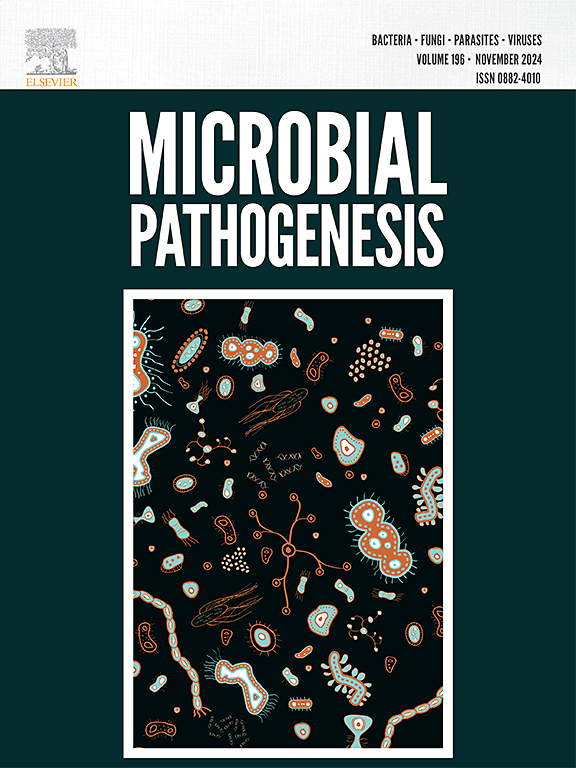The first report of submandibular lymph node infection with Flavobacterium ceti in a horse and its complete genome sequence
IF 3.3
3区 医学
Q3 IMMUNOLOGY
引用次数: 0
Abstract
This is the first report describing the isolation and genome sequence of Flavobacterium ceti (F. ceti IJFC025) from a draining submandibular lymph node abscess in a 6-year-old mixed-breed mare in Korea. Since F. ceti is not a usual infectious pathogen that causes equine health problems, this study presents the complete genome sequence of F. ceti isolated from a submandibular lymph node abscess sample in Jeju, South Korea, in 2022. The entire genome sequence of F. ceti IJFC025 consisted of a 3,144,426-bp chromosome with 35.6 % G + C content. Gene prediction revealed that this strain possesses 2909 coding sequences (CDSs), 74 tRNAs, and five rRNAs. Average nucleotide identity analysis of the whole-genome sequence revealed 98.6 %–98.8 % nucleotide identity between F. ceti IJFC025 and F. ceti CECT7184, which was previously isolated from beaked whales. PathogenFinder revealed four different virulence genes in the genome that could potentially cause infections in horses. F. ceti CECT7184 contained genes encoding propionyl-CoA carboxylase, 3-oxoacid CoA-transferase A subunit, and the translation initiation factor IF-1, whereas F. ceti IJFC025 does not. Instead, F. ceti IJFC025 harbors genes encoding deoxyhypusine synthase, whereas F. ceti CECT7184 does not. Antimicrobial susceptibility tests revealed that F. ceti IJFC025 is a multidrug-resistant strain that is resistant to gentamicin, ceftazidime, nalidixic acid, ciprofloxacin, and colistin. However, no resistance genes were detected in the whole-genome sequence. Because of the similarity of the clinical signs with those of strangles, this pathogen needs to be included in the differential diagnosis of submandibular lymphadenopathy in horses.
首次报道一匹马的颌下淋巴结感染黄杆菌 ceti 及其完整基因组序列。
这是首次报道从韩国一匹 6 岁混血母马的颌下淋巴结引流脓肿中分离出 F. ceti(F. ceti IJFC025)并对其进行基因组测序。由于 F. ceti 并非导致马匹健康问题的常见感染性病原体,本研究展示了 2022 年从韩国济州岛颌下淋巴结脓肿样本中分离出的 F. ceti 的完整基因组序列。F. ceti IJFC025的全基因组序列由3,144,426-bp染色体组成,G+C含量为35.6%。基因预测显示,该菌株拥有 2,909 个编码序列(CDS)、74 个 tRNA 和 5 个 rRNA。全基因组序列的平均核苷酸同一性分析表明,F. ceti IJFC025与之前从喙鲸体内分离出的F. ceti CECT7184的核苷酸同一性在98.6%到98.8%之间。PathogenFinder 在基因组中发现了四个不同的毒力基因,这些基因可能会导致马匹感染。F. ceti CECT7184含有编码丙酰-CoA羧化酶、3-氧代酸CoA-转移酶A亚基和翻译起始因子IF-1的基因,而F. ceti IJFC025则没有。相反,F. ceti IJFC025 含有编码脱氧羽扇豆碱合成酶的基因,而 F. ceti CECT7184 则没有。抗菌药敏感性测试表明,F. ceti IJFC025 是一种耐多种药物的菌株,对庆大霉素、头孢唑肟、萘啶酸、环丙沙星和可乐定耐药。不过,在全基因组序列中没有检测到耐药基因。由于该病原体的临床症状与绞股蓝相似,因此需要将其纳入马下颌淋巴结病的鉴别诊断中。
本文章由计算机程序翻译,如有差异,请以英文原文为准。
求助全文
约1分钟内获得全文
求助全文
来源期刊

Microbial pathogenesis
医学-免疫学
CiteScore
7.40
自引率
2.60%
发文量
472
审稿时长
56 days
期刊介绍:
Microbial Pathogenesis publishes original contributions and reviews about the molecular and cellular mechanisms of infectious diseases. It covers microbiology, host-pathogen interaction and immunology related to infectious agents, including bacteria, fungi, viruses and protozoa. It also accepts papers in the field of clinical microbiology, with the exception of case reports.
Research Areas Include:
-Pathogenesis
-Virulence factors
-Host susceptibility or resistance
-Immune mechanisms
-Identification, cloning and sequencing of relevant genes
-Genetic studies
-Viruses, prokaryotic organisms and protozoa
-Microbiota
-Systems biology related to infectious diseases
-Targets for vaccine design (pre-clinical studies)
 求助内容:
求助内容: 应助结果提醒方式:
应助结果提醒方式:


